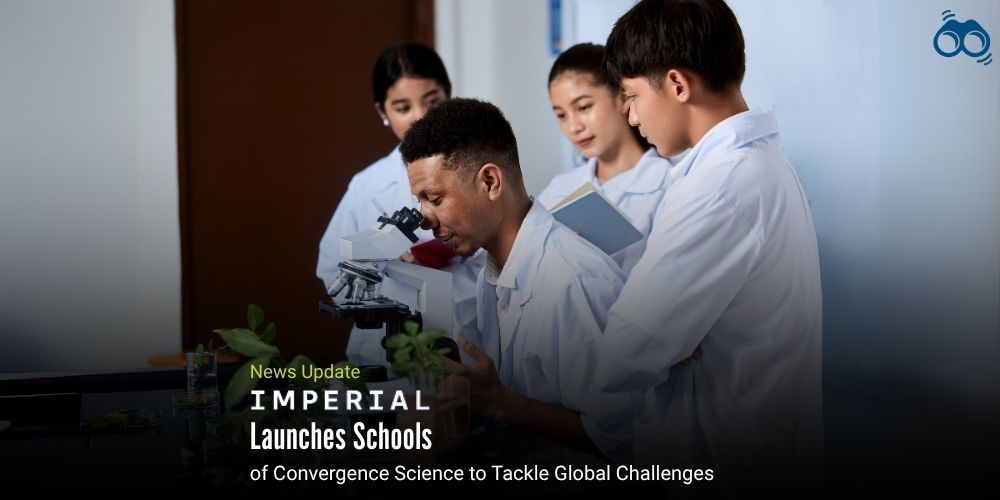Imperial's Bold Vision Gains Government Backing for Convergent Science Model
Breaking Disciplinary Barriers: Imperial Unveils New Model for Research and Innovation
Imperial College London has taken a significant step towards redefining the landscape of research and innovation with the launch of its Schools of Convergence Science. This pioneering initiative is intended to accelerate scientific discovery and drive economic growth by uniting expertise across multiple disciplines. The university describes Convergence Science as a transformative model that extends beyond traditional academic collaboration. It merges disciplines, sectors, and methods to create innovative tools, models, and solutions for complex global challenges. By removing boundaries between academia and industry, the initiative aims to accelerate the journey from research to real-world application, while fostering entrepreneurial thinking and bold inquiry.
The newly established Schools, Health and Technology, Sustainability, Space, Security and Telecoms, and Human and Artificial Intelligence, will form interdisciplinary research communities rooted in deep integration and systems thinking. These communities will address a range of pressing issues such as clean air and water, empathetic AI, advanced health diagnostics, and rapid disaster response. They also serve as a core pillar of Imperial’s Science for Humanity strategy, launched to amplify the university’s global impact.
Imperial’s President, Professor Hugh Brady, emphasised that the university community is united in addressing today’s most urgent challenges. He noted that the new Schools would strengthen this mission by advancing scientific progress with boldness, scale, and resolve. Supporting this view, Vice-Provost (Research and Enterprise) Professor Mary Ryan highlighted the importance of delivering a future that is healthy, safe, sustainable, and prosperous. She stated that challenges such as climate change, health inequality, and digital security are deeply interconnected, and that Imperial’s convergence approach is designed to meet this complexity through integrated, multidisciplinary methods.
Professor Ryan further described the Schools as “constructive disruptors,” uniting the university’s strengths in science, engineering, business, and medicine to provide impactful global solutions through a renewed scientific vision. UK Science Minister Lord Vallance also voiced support for the initiative, stating that it exemplifies how mission-driven science can benefit society. He praised Imperial’s cross-sector collaboration model, linking academia, government, and industry, as essential for generating breakthroughs that might not emerge in isolated environments.
Each School will be led by a multidisciplinary team. The School of Health and Technology, under the leadership of Anthony Bull (Convener), supported by Iain McNeish, Marisa Miraldo, and Faith Osier, will focus on shifting healthcare from reactive treatment to proactive lifelong health across diverse populations. The School of Sustainability, headed by Mirabelle Muûls (Convenor) with Benjamin Barratt, Alyssa Gilbert, and Nilay Shah, will develop solutions that balance planetary health and human wellbeing, aiming for a sustainable future in harmony with the Earth.
The School of Human and Artificial Intelligence, led by Alessandra Russo (Convenor), along with Payam Barnaghi, Will Branford, and Aldo Faisal, will work to strengthen the partnership between humans and intelligent systems, using AI to amplify human potential and cross-disciplinary progress. Meanwhile, the School of Space, Security and Telecoms, directed by Jonathan Eastwood (Convener) with Kin Leung, Julie McCann, and Matthew Santer, will concentrate on connecting and protecting global systems, leading research at the intersection of space technology, communications, and global security. Imperial College London’s Schools of Convergence Science offer a bold, integrated approach to global problem-solving, positioning the university as a leader in shaping research for the future.
Editor’s Note:
Imperial College London’s Schools of Convergence Science represent a pivotal development in the university's approach to intricate global challenges. Through the dissolution of conventional disciplinary boundaries, this initiative unites leading expertise from science, engineering, business, and medicine to generate tangible, real-world impact. In an era characterised by increasingly interconnected problems, such as climate change, health disparities, and digital security, this model of integrated, mission-driven research is not merely opportune; it is imperative. The leadership, organisational framework, and aspirational scope underpinning these new Schools signify a profound dedication to sustained innovation that transcends the confines of laboratory research or academic instruction.
Skoobuzz highlights that Imperial College London’s launch of the Schools of Convergence Science reflects a timely and strategic evolution in the mission of higher education. It sets a compelling benchmark for how academic institutions can, and should, respond to the complexity of global challenges with clarity of purpose, depth of expertise, and an unwavering commitment to societal advancement.














0 Comments (Please Login To Continue)